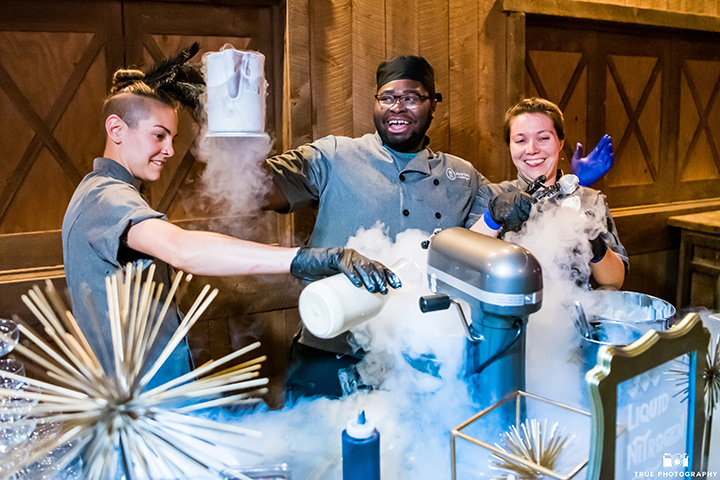The catering industry has been wringing its collective hands for years trying to make sense of a perpetually shrinking labor pool. In that time, technology has helped with some needs—such as apps to order a freelance cook to help with an event on short notice—but there isn’t a robot workforce coming in 2020 to permanently solve staffing struggles.
Caterers with up-to-date strategies for hiring and retaining talent are best positioned to succeed, and below is a snapshot of factors shaping today’s labor crunch, plus a few solutions to consider.
Strong economy
The catering industry is booming, due to a healthy economy and clients with robust budgets. However, that economy also gives the labor pool more options, so a worker who was previously attracted to part-time or full-time employment in catering, might be looking elsewhere.
“Someone can push a broom on a construction site for $20 to $25 an hour who may have been willing to wash dishes for $15 an hour. That’s a tough gap to bridge,” says Anthony Lambatos, CEO of Footers Catering in Denver, CO. “Also, the marijuana industry and cannabis dispensaries have taken a lot of people out of hospitality and catering here in Denver, and that has had a big impact on us.”

Part of the Footers Catering chef team. Photo courtesy True Photography
Minimum wage increase
The Federal minimum wage for covered nonexempt employees remains at $7.25 according to the U.S. Department of Labor (and hasn’t been increased since 2009) but only 21 states will still pay that in 2020. Elsewhere, hourly wages are climbing into the double digits. Those increases will continue incrementally over the next few years to account for cost of living, and that will have a ripple effect on caterers, since those labor costs are passed on to clients.
“When minimum wage goes up, everyone else’s wages do too, and that’s something maybe the public doesn’t understand,” says Lambatos, who will see Colorado’s minimum wage increase to $12 in 2020. “In the catering industry and foodservice overall, there’s not enough margin to absorb a 5% or 10% increase in minimum wage. That’s a tough pill to swallow because it impacts so many parts of your business.”
Registration is NOW OPEN for Catersource 2020, co-located with The Special Event! Click here for more information or to register!
Immigration policy
Depending on where a caterer is located, recent immigration policy has had a noticeable effect on the available labor pool, projected to shrink further in 2020.
“It definitely reduced our application flow here in Arizona, and you might find similar circumstances in other border states. It’s also harder to get work visas now. This has made it more important than ever for us to have a retention strategy for our staff,” says David Cronin, CPCE, CMP, and GM of W Scottsdale hotel.
Alternative labor pools
Caterers, like the rest of the foodservice industry, are looking at alternative labor pools to help fill the staffing void. These include high school students, retirees, middle-aged professionals seeking a career change, and teachers looking for a side gig when school is out. One area perhaps not explored enough is the “forgotten workforce” of parolees, as well as those aged out of foster care, abuse survivors, and recovering addicts.
Nonprofit organizations like Kitchens for Good in San Diego recognize that forgotten workforce as a potential solution to the labor crunch in catering. Kitchens for Good offers culinary training for 24 people at a time, going through 12 weeks/280 hours of instruction, followed by 2,500 hours of paid on-the-job training as an apprentice with San Diego-area caterers, hotels, and restaurants. After that, students receive an Apprenticeship Certification and can continue working full-time in their new careers.
“Because of what they’ve been through in their lives, they take this seriously and want to make this their career. We’re keeping people out of incarceration and giving them independence and a sense of self,” says Lori Love, director of hospitality, Kitchens for Good. So far, Kitchens for Good has a 75% graduation rate, and an 86% employment rate, placing 327 students in foodservice in four years.
Benefits & incentives
As Cronin mentioned earlier, retention strategies are a key part of staffing today, since finding a replacement is more difficult than ever. At W Scottsdale, the Marriott-based benefits package includes a 401K plan, health insurance, and eight weeks of paid time off for parental leave. Those perks are especially attractive to family-focused workers, but for younger staff, Cronin says incentives for outstanding work help keep them interested and invested in their jobs.
“There’s a lot of people that will leave a job as soon as a competitor offers a 20-cent raise. I believe incenting people to meet goals and rewarding them with a bonus or prize is effective,” he explains. “Many of the best workers have a competitive drive to succeed and want to be challenged, and you don’t want to lose those people—they’re very hard to replace.”
—Michael Costa
Learn more at Catersource 2020
Catersource education will offer a plethora of sessions specifically centered around staff development and business building. Here are a few to bring to your attention; check out the full schedule online at schedule.catersource.com.
Session 1: Heart Leadership with Anthony Lambatos and April Lambatos, 2:30 to 3:30, Thursday, March 12 on the Bridge stage
Session 2: Let’s Talk about Kitchens that Need More Love with Heather Carr and Tessa Reuber, 1:30 to 2:30, Tuesday, March 10
Session 3: Creating an Onboarding Guide that Sets You Up for Success with Sasha Souza and Mellysa Levy, 4:00 to 5:00 on Wednesday, March 11




